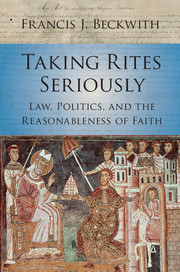Book contents
- Frontmatter
- Dedication
- Contents
- Acknowledgments
- 1 Introduction: Faith Seeking Understanding
- Part I Reason and Motive
- 2 Juris, Fides, et Ratio : What Judges and Some Legal Scholars Miss About Reason and Religious Beliefs
- 3 Theological Exclusionary Rule: The Judicial Misuse of Religious Motives
- Part II Dignity and Personhood
- Part III Nature and Sex
- Index
3 - Theological Exclusionary Rule: The Judicial Misuse of Religious Motives
from Part I - Reason and Motive
Published online by Cambridge University Press: 05 November 2015
- Frontmatter
- Dedication
- Contents
- Acknowledgments
- 1 Introduction: Faith Seeking Understanding
- Part I Reason and Motive
- 2 Juris, Fides, et Ratio : What Judges and Some Legal Scholars Miss About Reason and Religious Beliefs
- 3 Theological Exclusionary Rule: The Judicial Misuse of Religious Motives
- Part II Dignity and Personhood
- Part III Nature and Sex
- Index
Summary
The Religion then of every man must be left to the conviction and conscience of every man; and it is the right of every man to exercise it as these may dictate. This right is in its nature an unalienable right. It is unalienable, because the opinions of men, depending only on the evidence contemplated by their own minds cannot follow the dictates of other men: It is unalienable also, because what is here a right towards men, is a duty towards the Creator. It is the duty of every man to render to the Creator such homage and such only as he believes to be acceptable to him. This duty is precedent, both in order of time and in degree of obligation, to the claims of Civil Society. Before any man can be considered as a member of Civil Society, he must be considered as a subject of the Governour of the Universe: And if a member of Civil Society, who enters into any subordinate Association, must always do it with a reservation of his duty to the General Authority; much more must every man who becomes a member of any particular Civil Society, do it with a saving of his allegiance to the Universal Sovereign. We maintain therefore that in matters of Religion, no man's right is abridged by the institution of Civil Society and that Religion is wholly exempt from its cognizance. True it is, that no other rule exists, by which any question which may divide a Society, can be ultimately determined, but the will of the majority; but it is also true that the majority may trespass on the rights of the minority.
James Madison (1751–1836)In several federal cases concerning whether particular statutes or policies violate the First Amendment's prohibition of religious establishment, both the United States Supreme Court and other federal courts have rejected the constitutionality of these laws and policies on the grounds that they have an exclusively religious purpose. Aspects of the courts' analyses in some of these cases rely on the apparent religious motives of the statute's or policy's sponsors and/or citizen-supporters as the basis by which the courts infer that the law or policy in question has a religious purpose.
- Type
- Chapter
- Information
- Taking Rites SeriouslyLaw, Politics, and the Reasonableness of Faith, pp. 53 - 78Publisher: Cambridge University PressPrint publication year: 2015



